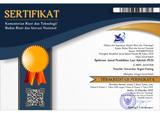Relationship between Moral Development by TPA Teachers and Children's Social Behavior in TPA / TPQ Mesjid Al-Iman, Gunung Sarik Village, Kuranji District, Padang City
 ), Wirdatul Aini(2),
), Wirdatul Aini(2), (1) Universitas Negeri Padang
(2) Universitas Negeri Padang
 Corresponding Author
Corresponding Author
DOI : https://doi.org/10.24036/spektrumpls.v9i1.111365
Full Text:
 Language : en
Language : en
Abstract
This research was motivated by the lack of social behavior of children at the TPA of the Al-Iman Mosque, this is presumably due to the low moral development given by teachers to children. This study aims to: 1) describe moral development by TPA teachers; 2) describe the child's social behavior; and 3) looking at the relationship between moral development by TPA teachers and children's social behavior in TPA Mesjid Al-Iman, Gunung Sarik Village, Kuranji District, Padang City. The approach in this research is a quantitative approach with correlational research type. The population in this study were all children who participated in the TPA at Al-Iman Mosque, amounting to 54 children, while the sample taken was 34 people using the stratified random sampling method. Data collection techniques in this study used structured interviews with data collection tools in the form of a list of statements. The data analysis technique used the percentage formula and product moment correlation. The results showed that; 1) moral development by TPA teachers at TPA Mesjid Al-Iman is still categorized as low, 2) social behavior of children at TPA Al-Iman is categorized as poor, and 3) there is a significant relationship between moral development by TPA teachers and children's social behavior in TPA Al-Iman Mosque, Gunung Sarik Village, Kuranji District, Padang City.
Keywords: Moral Development, Social Behavior, Al-Qur'an Education Park
References
Ahmadi, A. (2005). Psikologi Perkembangan (Revisi). Jakarta: Rineka Cipta.
Ahmadi, A. (2009). Psikologi Sosial. Jakarta: Rineka Cipta.
Aini, W. (2006). Bahan Ajar Konsep Pendidikan Luar Sekolah. Padang: FIP UNP.
Arikunto, S. (2014). Prosedur Penelitian Suatu Pendekatan Praktek. Jakarta: Rineka Cipta.
Barja, A. B. (2004). Psikologi Konseling dan Teknik Konseling. Jakarta: Studia Press.
Gerungan, W. . (1986). Psikologi Sosial. Bandung: Eresco.
Haedari, A. (2004). Masa Depan Pesantren: Dalam Tantangan Modernitas dan Tantangan Kompleksitas Global. Jakarta: IRD PRESS.
Helmawati. (2014). Pendidikan Keluarga. Bandung: Remaja Rosdakarya.
Hurlock, B. E. (1978). Perkembangan Anak. Jakarta: Erlangga.
Hurlock, E. B. (1995). Perkembangan Anak. Jakarta: Erlangga.
Izawati, S. (2011). Hubungan antara Pembinaan Akhlak dengan Perilaku Sosial Anak di Panti Asuhan As-Shohwah Kecamatan Tampan Pekanbaru. Universitas Islam Negeri Sultan Syarif Kasim Riau. Retrieved from http://repository.uin-suska.ac.id/838/
Kompri. (2015). Motivasi Pembelajaran Perspektif Guru dan Siswa. Bandung: PT. Remaja Rosdakarya Offset.
Mangunhardjono. (1985). Pembinaan Arti dan Metodenya. Yogyakarta: Kanisius.
Marliani, R. (2015). Psikologi Perkembangan. (B. A. Saebani, Ed.). Bandung: CV Pustaka Setia.
Muhaimin. (2002). Paradigma Pendidikan Islam: Upaya Mengefektifkan PAI di Sekolah. Bandung: Remaja Rosdakarya.
Muhaimin, Suti’ah, & Ali, N. (2012). Paradigma Pendidikan Islam: Upaya Mengefektifkan Pendidikan Agama Islam di Sekolah. Bandung: PT. Remaja Rosdakarya.
Nata, A. (2003). Akhlak Tasawuf (Kelima). Jakarta: PT Raja Grafindo Persada.
Papalia, D. E. (2010). Human Development (Psikologi Perkembangan). (A. K. Anwar, Ed.) (Kesembilan). Jakarta: Kencana.
Sudarsono. (2005). Etika Islam Tentang Kenakalan Remaja. Jakarta: Rineka Cipta.
Syamsiah. (2019). Konsep Pembinaan Akhlak di TK-TPA Al-Manar dalam Pandangan Bimbingan Konseling Islam di Kelurahan Arateng Kabupaten Sidenreng Rappang. IAIN Parepare. Retrieved from http://repository.stainparepare.ac.id/819/
Tilaar. (2001). Manajemen Pendidikan Nasional. Bandung: Remaja Rosdakarya.
Walgito, B. (2001). Psikologi Suatu pengantar. Yogyakarta: Andi.
 Article Metrics
Article Metrics
 Abstract Views : 178 times
Abstract Views : 178 times
 PDF Downloaded : 65 times
PDF Downloaded : 65 times
Refbacks
- There are currently no refbacks.

This work is licensed under a Creative Commons Attribution-NonCommercial 4.0 International License.



